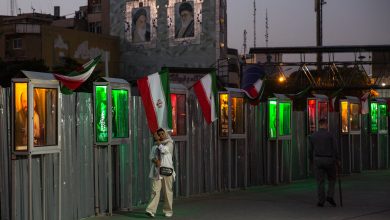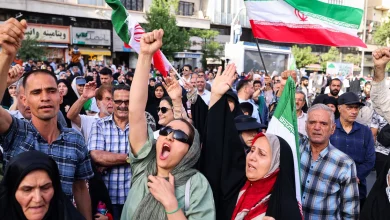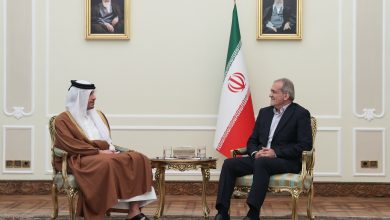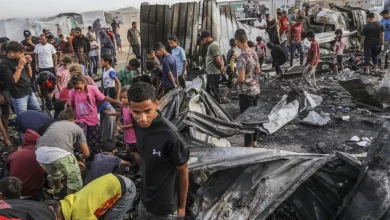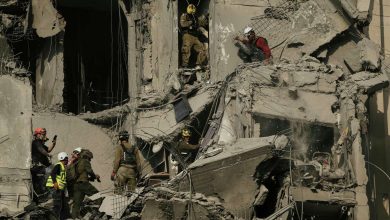Zionist regime tanks enter the West Bank for the first time in two decades amid speculation of potential forcible annexation
In the dimly lit basement of a building in Jenin, a city situated in the occupied West Bank, a family found themselves ensconced in their home, which had transformed into a virtual prison amidst the conflict. The advancing tanks' thunderous rumblings rattled the very foundations of their shelter, while a barrage of bombs descended from above.
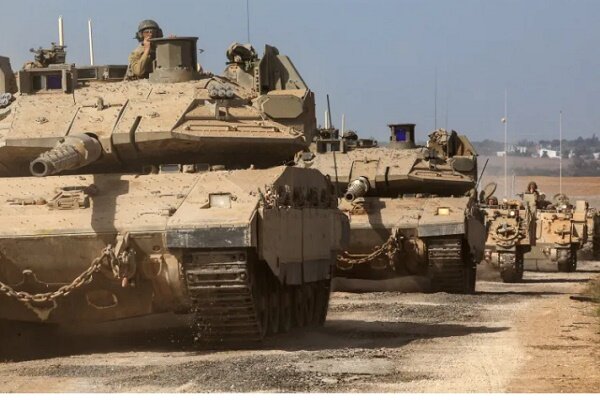
A concerned mother held her children closely, her anxiety apparent as she navigated the tense situation. Her husband attempted to diffuse the tension, while elderly grandparents supported one another in a display of mutual comfort.
Over an extended period, the residents endured continuous assaults from Israeli military forces. They observed with a sense of powerlessness as their city fell into disarray, with friends and neighbors seemingly disappearing without a trace.
In recent developments, the Israeli military has escalated its operations in the occupied West Bank over the last month, culminating in the deployment of tanks in Jenin. This marks the first such deployment since the military conducted significant operations against Palestinians during the Second Intifada from 2000 to 2005.
After a 15-month military campaign in Gaza that did not meet its declared goals, including the dismantling of Hamas, Israel has agreed to a ceasefire. The agreement follows longstanding terms proposed by Hamas, marking a significant development in the conflict.
In the aftermath of the significant setback in Gaza and the ceasefire established on January 19, Israeli authorities have refocused their military efforts on the occupied West Bank, initiating operations in the city on January 21.
**Israel’s Actions in the Occupied West Bank**
The State of Israel has been actively involved in a variety of operations and developments within the occupied West Bank territory. These activities include military operations, settlement expansion, infrastructure development, and security measures, which are often justified as necessary for national security and protection against militant activities. The situation remains complex and contentious, with frequent clashes reported between Israeli forces and Palestinian residents, alongside international calls for peace and negotiation. The geopolitical landscape of the West Bank continues to evolve, with global diplomatic efforts focused on addressing the longstanding Israeli-Palestinian conflict.
In the last 36 days, Israeli forces have intensified operations in Palestinian territories, conducting house raids and deploying bulldozers to dismantle crucial infrastructure. These activities have been concentrated primarily in the northern areas of Jenin and Tulkarem.
In a recent operation, occupation forces conducted raids in the southern region of the occupied West Bank. The raids targeted several locations, including Kobar and Silwad to the north of Ramallah, along with the Beitunia neighborhood within Ramallah itself and the area of al-Khalil.
According to Palestinian sources, Israeli forces are implementing war strategies in the occupied West Bank that mirror the tactics previously utilized in Gaza. This assertion is supported by the military’s recent deployment of tanks, significant devastation in the Jenin refugee camp, the creation of roadways, and proposed plans to establish a new military base.
Last week, Jenin Mayor Mohammed Jarrar criticized the Israeli military for what he termed as a systematic approach of indiscriminate devastation in the camp and its surrounding areas, leading to conditions he described as making the region “uninhabitable.”
Recent reports reveal that more than 40,000 Palestinians have been compelled to leave their homes in the refugee camps of Jenin, Tulkarem, Nur Shams, and Al-Fara’a. This represents the most significant displacement in the occupied West Bank since the 1967 conflict, during which Israel took control of areas west of the Jordan River, including East Jerusalem and the Gaza Strip.
Palestinians who have been forcibly displaced are currently residing in critically challenging conditions, occupying temporary shelters in overcrowded schools and mosques within the occupied city.
Nihad al-Shawish, the head of the Nur Shams camp services committee, has highlighted the dire situation faced by the remaining residents in the refugee camp. These individuals are currently trapped and facing significant challenges in obtaining essential resources.
A statement from last week indicated that the Civil Defence, the Red Crescent, and Palestinian security forces delivered food supplies to those in need. Meanwhile, military operations involving bulldozers continued to dismantle the camp.
The Israeli advocacy organization Physicians for Human Rights (PHR) has reported a critical deficiency in food, electricity, and medical provisions within the occupied West Bank. The group further alleges that the Israeli military is hindering the operations of Red Crescent vehicles and humanitarian services, resulting in significant delays in the provision of first aid and the transportation of patients to medical facilities for necessary treatment.
Since January 21, the Palestinian refugee camps in Jenin and surrounding regions have experienced a significant increase in fatalities, with at least 27 Palestinians, including minors, dying amid ongoing Israeli military operations.
The continued military operation in Jenin and the adjacent refugee camp has led to numerous injuries, the capture of more than 160 people, and extensive damage, including the total destruction of hundreds of residential buildings and partial harm to thousands of homes.
The blockade of the Jenin camp represents the latest development in an extended siege, which began with efforts by Palestinian Authority forces and was later taken over by the Israeli military.
The implementation of stringent measures has led to significant restrictions on residents’ mobility, alongside the cessation of essential services, including water and electricity, within the camp.
Originally set up as shelters for the descendants of Palestinian refugees who were forcibly displaced during the 1948 Nakba, which ensued from Israel’s controversial formation and subsequent occupation of Palestinian territories, these camps have consistently functioned as key bases for resistance factions opposing Israeli rule.
The occupied West Bank, home to around 3.3 million Palestinians, boasts a population that surpasses that of the blockaded Gaza Strip by about one million.
Over recent years, the camps have frequently come under attack by the occupying forces. Following the onset of hostilities in Gaza on October 7, 2023, Israel has escalated its military operations in the occupied West Bank, deploying helicopters and drones in a campaign that has intensified hostilities and heightened fear among local populations.
The recent large-scale offensive, along with the deployment of tanks following the negotiation of a ceasefire agreement in the heavily besieged and bombarded Gaza Strip, signifies an unprecedented escalation in the conflict.
Recent footage circulating on social media from the Jenin refugee camp depicts Palestinian youths and children engaged in a confrontation with Israeli military forces. The video captures these individuals armed with stones, opposing the movement of advancing Israeli tanks.
In a recent incident, a young Palestinian protester encountered a forceful response when a tank operator directed its cannon and turret towards him and others in the vicinity. Shortly thereafter, tear gas was deployed, dispersing the assembly of young men and children who had congregated in a demonstration of dissent.
The Palestinian news agency WAFA has reported ongoing incidents involving Israeli military and settler activities in the occupied West Bank, as of Monday and Tuesday. According to the report, Israeli forces continued operations that targeted and detained Palestinians, including minors, throughout the region.
In the town of al-Khader, situated to the south of Bethlehem, numerous Palestinians experienced suffocation following a raid conducted by the Israeli military. Concurrently, in Beita, a town near Nablus, Israeli forces caused damage to Palestinian vehicles, according to local sources.
Israeli forces conducted operations across the West Bank, resulting in the arrest of at least five Palestinian individuals on the same day.
At the same time, Israeli settlers, escorted by security forces, made their way into the Al-Aqsa Mosque courtyards via the Al-Maghariba Gate, escalating tensions in the area.
On Tuesday, reports emerged that occupation forces forcibly entered the Imam Ali Mosque in Nablus, located in the northern West Bank. It has been reported that the soldiers detonated the doors of the mosque and seized surveillance camera recordings from the premises.
Since the onset of hostilities initiated by Israel against Gaza in October 2023, reports indicate that Israeli forces have been responsible for the deaths of over 900 Palestinians in the occupied West Bank, according to conservative estimates.
Israel’s Objectives in the West Bank:
Israel’s interests in the West Bank are complex and multifaceted, encompassing security concerns, historical and religious connections, and political considerations. The region is crucial for Israel’s national security, providing a buffer zone against potential threats. Additionally, many Israelis have historical and cultural ties to the area, with some seeing it as an integral part of the biblical homeland. Politically, the West Bank plays a significant role in the Israeli-Palestinian conflict, with debates centering around settlement expansion, the rights of Palestinian residents, and the potential for a two-state solution. Israel’s strategies and policies in the West Bank often reflect a balance between these diverse motivations.
In response to a series of explosions targeting empty buses near Tel Aviv on Thursday, Israeli Prime Minister Benjamin Netanyahu has directed the military to launch an “intensive operation” in the West Bank.
No casualties have been reported following a series of explosions, and as of now, no organization has taken responsibility for the incidents. However, the arrest of two Israeli settlers has prompted suspicion that these events could be orchestrated “false flag operations,” potentially aimed at justifying increased military raids in the West Bank.
According to recent reports from Israeli media outlets, the Israeli military is planning to create extensive corridors in the West Bank areas of Tulkarem and Jenin. These corridors are expected to be similar in nature to the Netzarim Corridor previously constructed in Gaza.
The proposed corridors are anticipated to allow unhindered movement for Israeli forces and their heavy machinery, potentially partitioning the occupied region.
On Sunday, Israel’s Minister of Military Affairs, Israel Katz, announced that the Israeli Defense Forces have been directed to maintain their presence in the northern regions of the occupied West Bank. This move aims to prevent the return of Palestinian residents, according to the minister’s statement.
A government official has announced that military personnel are gearing up for an “extended presence” in certain refugee camps for the forthcoming year. This controversial strategy is seen as a violation of international law and United Nations resolutions.
In a statement issued on Sunday, the Gaza-based resistance group Hamas criticized Katz’s comments, characterizing them as “reckless delusions” and asserting that such remarks are destined to fail.
The group announced that its members and resistance efforts are ready to counter these plans, highlighting that the presence of tanks in the occupied West Bank signifies Israel’s intent to intensify its aggressive actions against Palestinians.
The movement has declared that the deployment of tanks, a measure not seen in years, underscores the adversary’s perilous ambition to intensify its genocidal assault on the Palestinian populace, thereby prolonging an unparalleled campaign of destruction and devastation.
What Measures is the United States Employing to Support Israel in West Bank Operations?
Israel is reportedly violating international laws through the forcible displacement of Palestinians and the resulting devastation in the occupied West Bank, actions that are occurring with the support of the United States government.
The region is facing increased fragmentation due to the presence of unauthorized Israeli settlements. Approximately 700,000 Israeli settlers are currently living in over 250 settlements and outposts located in the occupied West Bank and East Jerusalem. These settlements are deemed illegal under international law.
The occupied territory is poised to encounter additional challenges amid the prospect of Donald Trump’s return to the White House.
In his initial term, former President Donald Trump significantly altered longstanding United States policy by officially recognizing Jerusalem as the capital of Israel. Additionally, his administration declared that the Israeli settlements in the occupied West Bank, previously deemed illegal under international law, would no longer be classified as violations.
In a series of executive actions enacted shortly after taking office last month, former President Donald Trump lifted sanctions targeting over 30 illegal Israeli settler groups and entities. These sanctions had been imposed by the previous administration under President Joe Biden. This decision came just days ahead of Trump’s scheduled meeting with Israeli Prime Minister Benjamin Netanyahu.
In addition, his latest proposal to assume control over Gaza and forcibly relocate its 2.3 million residents abroad has heightened tensions and raised concerns over the potential for another ethnic cleansing initiative.
According to analysts, the resurgence of Donald Trump has invigorated proponents advocating for the “total Israeli annexation” of the occupied West Bank. This observation is supported by comments from members of Trump’s cabinet and advisors.
In a recent development, Republican legislators have put forth bills in both the United States House of Representatives and the Senate, proposing the replacement of the term “West Bank” with “Judea and Samaria” in official government documents and materials. This move has sparked apprehension that initiatives aimed at annexation could be gaining ground.
**Global Reactions to Israel’s Military Operation in the West Bank**
The international community has been closely monitoring Israel’s recent military actions in the West Bank, with various countries and organizations expressing a broad spectrum of responses. The offensive has sparked significant concern among global leaders, who are urging restraint and calling for a de-escalation of tensions in the region.
Many governments have issued statements highlighting the need for adherence to international humanitarian laws and placing emphasis on the protection of civilian lives. Some nations have expressed solidarity with Israel’s security concerns, while others have voiced criticism over the use of force and its potential impact on the already fragile peace process.
In the United Nations, discussions have been initiated to address the situation, with members of the Security Council engaging in deliberations on how best to approach the unfolding events. Calls for dialogue and negotiation have been amplified by international bodies seeking to mediate the heightened conflict.
The unfolding events in the West Bank continue to draw widespread attention and responses, reflecting the complex dynamics and geopolitical implications of the situation.
Pro-Palestinian activists worldwide have expressed their strong disapproval and apprehension regarding Israel’s proposed plans for the “complete annexation” of the occupied West Bank.
Critics have expressed disapproval towards Israel’s Western allies, highlighting their silence amidst increasing aggressive actions by Israel.
Jeremy Corbyn, the former leader of the United Kingdom’s Labour Party, has criticized Israel’s decision to deploy tanks in the occupied West Bank. Corbyn described the move as a potential step towards “full annexation” and an overt violation of the tenuous ceasefire agreement in the Gaza Strip.
In a post on X made on Sunday, the user described the recent actions as a precursor to full annexation, criticizing them as undermining the ceasefire agreement, which they allege Israel continues to breach.
“The situation amounts to ethnic cleansing, and the continued inadequacy of our government’s response in upholding international law is deeply disgraceful,” he stated.
Jeremy Corbyn, a prominent advocate for Palestinian rights in the United Kingdom, has asserted that implementing economic sanctions and a comprehensive arms embargo are the sole avenues to achieving peace and terminating the occupation in Palestine.
Assal Rad, a scholar specializing in West Asian history and active on social media, has publicly criticized Western media outlets, accusing them of downplaying or misrepresenting Israel’s military operations in the West Bank.
In a statement drawing comparisons to the ongoing conflict in Gaza, where reports indicate that more than 48,000 Palestinians have lost their lives over the last 15 months, Rad accused Western media of disproportionately favoring the Israeli perspective. He claimed that these outlets have consistently propagated the Israeli narrative, often without critical examination of its accuracy.
In a recent post on the social media platform X, an individual expressed criticism of Western media portrayals of conflict, arguing that the narrative is skewed to depict those resisting with stones as aggressors, while portraying the occupants of tanks, who are engaged in the destruction of homes, as acting in self-defense.
Rad has expressed criticism of Western media, accusing it of facilitating approval for actions taken by Israel in the West Bank, which he describes as war crimes. According to Rad, the forced displacement of residents and the obstruction of their return equate to ethnic cleansing. He challenges the terminology used, asserting that these individuals are not being “evacuated” but rather are experiencing illegal occupation by Israel.
Mariam Barghouti, an American-Palestinian writer and journalist, expressed concerns about the portrayal of the recent Israeli military operation in the occupied West Bank as an isolated incident, suggesting such characterization does not accurately reflect the ongoing situation.
She observed that the situation represents a repetition of previous offenses, now executed on a more extensive and heightened scale.
A recent statement has highlighted that media coverage is intensifying around Israeli military operations in the West Bank. The narrative frequently cites that for the first time in 20 years, Israeli tanks have entered the region, suggesting an unexpected development. However, it is important to note that this marks the second significant large-scale military offensive by Israel in the West Bank within the same period.
Observers have noted that Israel appears to be engaging in actions reminiscent of past offenses, albeit with increased intensity and scale, rather than pursuing any new strategies or developments.
Hanan Ashrawi, a seasoned Palestinian leader, legislator, activist, and scholar, has underscored allegations of systematic ethnic cleansing and the demolition of refugee camps by Israel in the northern part of the occupied West Bank.
In a recent post on the social media platform X, allegations were made accusing the Israeli government of engaging in what was described as a systematic effort against Palestinian communities in the northern West Bank. The post claimed that Israeli actions constituted ethnic cleansing and destruction of refugee camps, with specific mention of towns such as Qabatiya. It further accused the Israeli government of permanently expelling residents and preparing for military reinvasion, including the potential use of tanks against civilian populations. These actions were labeled as part of an official policy described as genocidal.
Mark Seddon, serving as the Director of the Centre for United Nations Studies at the University of Buckingham, UK, has expressed strong condemnation of the continuing ethnic cleansing reportedly taking place in the occupied West Bank. He highlighted the persistent silence from Western nations, critiquing their repeated failure to respond to such atrocities over the years.
He stated that reports of ethnic cleansing and the deaths of numerous civilians, including children, attributed to actions by the Israeli Defense Forces (IDF) in the occupied West Bank have emerged. He further noted that the response from Western nations has been notably muted.

